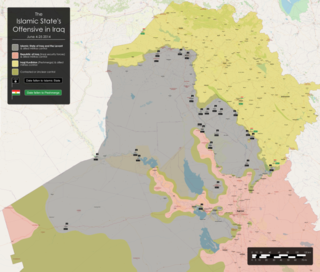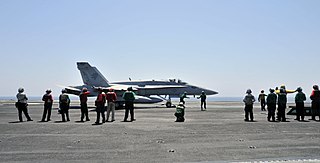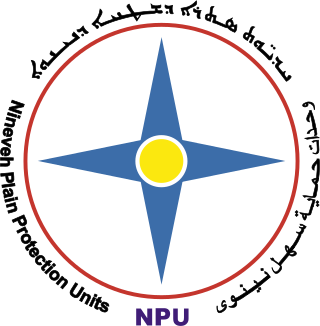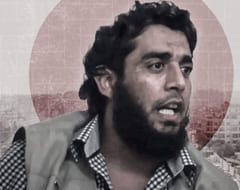
Operation al-Shabah was launched in May 2013 by the Iraqi Army, with the stated aim of severing contact between the Islamic State of Iraq and the Levant and the al-Nusra Front in Syria by clearing militants from the border area with Syria and Jordan.

The Northern Iraq offensive began on 4 June 2014, when the Islamic State of Iraq and Levant, assisted by various insurgent groups in the region, began a major offensive from its territory in Syria into Iraq against Iraqi and Kurdish forces, following earlier clashes that had begun in December 2013 involving guerillas.

On 15 June 2014, U.S. President Barack Obama ordered United States forces to be dispatched in response to the Northern Iraq offensive of the Islamic State (IS) as part of Operation Inherent Resolve. At the invitation of the Iraqi government, American troops went to assess Iraqi forces and the threat posed by ISIL.

The Nineveh Plain Protection Units or NPU is an Assyrian paramilitary organization that was formed in late 2014, largely but not exclusively by Assyrians in Iraq to defend themselves against Islamic State of Iraq and the Levant (ISIL). The Nineveh Plains is a region where Assyrians originate from and have lived there for thousands of years.

The Popular Mobilization Forces (PMF), also known as the People's Mobilization Committee (PMC) and the Popular Mobilization Units (PMU) is an Iraqi state-sponsored umbrella organization composed of approximately 67 different armed factions, with around 230,000 fighters that are mostly Shia Muslim groups, but also include Sunni Muslim, Christian, and Yazidi groups. The Popular Mobilization Units as a group was formed in 2014 and have fought in nearly every major battle against ISIL. Many of its main militias, in particular the Shias, trace their origins to the "Special Groups", Iranian-sponsored Shi'ite groups which previously fought an insurgency against the United States and the Coalition forces, as well as a sectarian conflict against Sunni Jihadist and Ba'athist insurgents. It has been called the new Iraqi Republican Guard after it was fully reorganized in early 2018 by its then–Commander in Chief Haider al-Abadi, Prime Minister of Iraq from 2014 to 2018, who issued "regulations to adapt the situation of the Popular Mobilization fighters".

The Mosul offensive (2015) was an offensive launched by Kurdish Peshmerga forces on 21 January 2015, with the objective of severing key ISIL supply routes to Mosul, Iraq, and to recapture neighboring areas around Mosul. The effort was supported by US-led coalition airstrikes. The Iraqi Army was widely expected to launch the planned operation to retake the actual city of Mosul in the Spring of 2015, but the offensive was postponed to October 2016, after Ramadi fell to ISIL in May 2015.

The Shirqat offensive, codenamed Operation Conquest or Operation Fatah, was an offensive against the positions of the Islamic State of Iraq and the Levant (ISIL) in and around the district of Al-Shirqat District to reach the city of Mosul.
This is a timeline of events during the War in Iraq in 2016.

The Battle of Mosul was a major battle initiated by the Iraqi Government forces with allied militias, the Kurdistan Regional Government, and international forces to retake the city of Mosul from the Islamic State (ISIL), which had seized the city years prior in June 2014. It was the largest conventional land battle since the capture of Baghdad in 2003, it was also the world's single largest military operation overall since the 2003 invasion of Iraq and was considered the toughest urban battle since World War II. The operation, which was called Operation "We Are Coming, Nineveh", began on 16 October 2016, with forces besieging ISIL-controlled areas in the Nineveh Governorate surrounding Mosul, and continued with Iraqi troops and Peshmerga fighters engaging ISIL on three fronts outside Mosul, going from village to village in the surrounding area in the largest deployment of Iraqi troops since the 2003 invasion of Iraq.

Violence against LGBT people is part of the ideology of ISIL, which mandates capital punishment for homosexuality within its territory, in Iraq, Syria and Libya.
The 2017 Western Nineveh offensive, code-named Operation Muhammad, Prophet of God, was launched by the Iraqi Popular Mobilization Forces (PMF) against the Islamic State of Iraq and the Levant (ISIL) in the western Nineveh province of northern Iraq in late April 2017.
During the course of the Battle of Mosul (2016–17), an international coalition, primarily composed of the Iraqi Army, Kurdish Peshmerga, CJTF–OIR, along with the allied Popular Mobilization Forces, Company A, 2-502 Infantry Regiment, 101st Airborne Division, captured Mosul from the Islamic State, which had used Mosul as the capital for the Iraqi half of its "caliphate".

Maysar Ali Musa Abdullah al-Juburi, also known as Abu Maria al-Qahtani, was an Iraqi Islamic militant who fought in the Iraqi insurgency and then the Syrian Civil War. He was a commander and Shura Council member in Jabhat al-Nusra.
The following is a timeline of the Battle of Mosul (2016–17) between October and December 2016.
Wahida Mohamed al-Jumaily, better known as Um Hanadi, is an Iraqi fighter and commander of the Popular Mobilization Forces (PMF) who fought against Islamic State of Iraq and the Levant in the Al-Shirqat District. She is the only female commander in the PMF and leads her own unit in the district. She lost two husbands to ISIL and is known for her brutality against ISIL fighters. She was feature in the documentary Mosul directed by Dan Gabriel.
This is a timeline of events during the Islamic State insurgency in Iraq (2017–present) in 2022.
This is a timeline of events during the Islamic State insurgency in Iraq (2017–present) in 2021.
This is a timeline of events during the Islamic State insurgency in Iraq (2017–present) in 2020.
This is a timeline of events during the Islamic State insurgency in Iraq (2017–present) in 2018.










